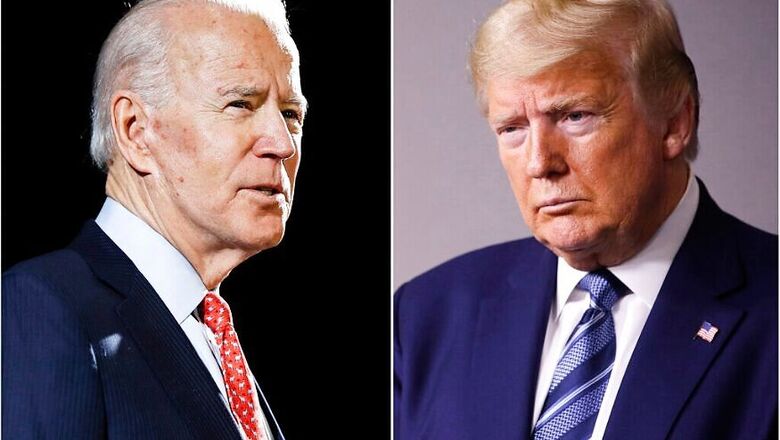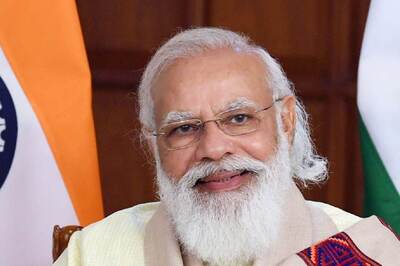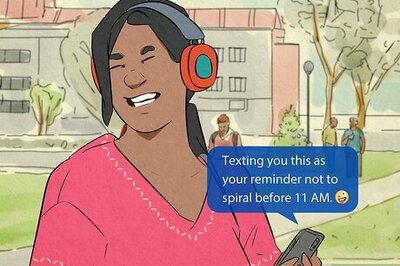
views
Joe Biden has taken a commanding lead over President Donald Trump in the 2020 race, building a wide advantage among women and nonwhite voters and making deep inroads with some traditionally Republican-leaning groups that have shifted away from Trump following his ineffective response to the coronavirus pandemic, according to a new national poll of registered voters by The New York Times and Siena College.
Biden is currently ahead of Trump by 14 percentage points, garnering 50% of the vote compared with 36% for Trump. That is among the most dismal showings of Trump’s presidency, and a sign that he is the clear underdog right now in his fight for a second term.
Trump has been an unpopular president for virtually his entire time in office. He has made few efforts since his election in 2016 to broaden his support beyond the right-wing base that vaulted him into office with only 46%of the popular vote and a modest victory in the Electoral College.
But among a striking cross-section of voters, the distaste for Trump has deepened as his administration failed to stop a deadly disease that crippled the economy and then as he responded to a wave of racial-justice protests with angry bluster and militaristic threats. The dominant picture that emerges from the poll is of a country ready to reject a president whom a strong majority of voters regard as failing the greatest tests confronting his administration.
Biden leads Trump by enormous margins with black and Hispanic voters, and women and young people appear on track to choose Biden by an even wider margin than they favored Hillary Clinton over Trump in 2016. But the former vice president has also drawn even with Trump among male voters, whites and people in middle age and older — groups that have typically been the backbones of Republican electoral success, including Trump’s in 2016.
Arlene Myles, 75, of Denver, said she had been a Republican for nearly six decades before switching her registration to independent earlier this year during Trump’s impeachment trial. Myles said that when Trump was first elected, she had resolved to “give him a chance,” but had since concluded that he and his party were irredeemable.
“I was one of those people who stuck by Nixon until he was waving goodbye,” Myles said. “I thought I was a good Republican and thought they had my values, but they have gone down the tubes these last few years.”
Myles said she planned to vote for Biden, expressing only one misgiving: “I wish he was younger,” she said.
Most stark may be Biden’s towering advantage among white women with college degrees, who support him over Trump by 39 percentage points. In 2016, exit polls found that group preferred Clinton to Trump by just 7 percentage points. The poll also found that Biden has narrowed Trump’s advantage with less-educated white voters.
The exodus of white voters from the GOP has been especially pronounced among younger voters, an ominous trend for a party that was already heavily reliant on older Americans.
Fifty-two percent of whites under 45 said they supported Biden while only 30% said they supported Trump. And their opposition is intense: More than twice as many younger whites viewed the president very unfavorably than very favorably.
Tom Diamond, 31, a Republican in Fort Worth, Texas, said he planned to vote for Trump but would do so with real misgivings. He called the president a “poor leader” who had mishandled the pandemic and said Biden seemed “like a guy you can trust.” But Trump held views closer to his own on the economy, health care and abortion.
“Part of you just feels icky voting for him,” Diamond said. “But definitely from a policy perspective, that’s where my vote’s going to go.”
Some unease toward Trump stems from voters’ racial attitudes. According to the poll, white voters under 45 are overwhelmingly supportive of the Black Lives Matter movement, while older whites are more tepid in their views toward racial justice activism. And nearly 70% of whites under 45 said they believed the killing of George Floyd was part of a broader pattern of excessive police violence toward African Americans rather than an isolated incident.
What’s striking, though, is that even among white seniors, one of Trump’s strongest constituencies, he has damaged himself with his conduct. About two-fifths of whites over 65 said they disapproved of Trump’s handling of both the coronavirus and race relations.
Trump retains a few points of strength in the poll that could offer him a way to regain a footing in the race, and the feeble condition of his candidacy right now may well represent his low point in a campaign with 4 1/2 months still to go.
His approval rating is still narrowly positive on the issue of the economy, with 50% of voters giving him favorable marks compared with 45% saying the opposite. Should the fall campaign become a referendum on which candidate is better equipped to restore prosperity after the pandemic has subsided, that could give Trump a new opening to press his case.
The president is also still ahead of Biden among white voters without college degrees, who hold disproportionate influence in presidential elections because of how central the Midwest is to capturing 270 electoral votes.
Yet if Trump still has a significant measure of credibility with voters on the economy, he lacks any apparent political strength on the most urgent issues of the moment: the pandemic and the national reckoning on policing and race.
Nearly three-fifths of voters disapprove of Trump’s handling of the coronavirus pandemic, including majorities of white voters and men. Self-described moderate voters disapproved of Trump on the coronavirus by a margin of more than 2-1.
Most of the country is also rejecting Trump’s call to reopen the economy as quickly as possible, even at the cost of exposing people to greater health risks. By a 21-point margin, voters said the federal government should prioritize containing the coronavirus, even if it hurts the economy, a view that aligns them with Biden.
Just a third of voters said the government should focus on restarting the economy even if that entails greater public-health risks.
That debate could become the central focus of the campaign in the coming weeks, as coronavirus outbreaks grow rapidly in a number of Republican-led states that have resisted the strict lockdown measures imposed in the spring by Democratic states like New York and California.
The public also does not share Trump’s resistance to mask wearing. The president has declined to don a mask in nearly all public appearances, even as top health officials in his administration have urged Americans to do so as a precaution against spreading the coronavirus. In the poll, 54% of people said they always wear a mask when they expect to be in proximity to other people, while another 22% said they usually wear a mask.
Just 22% said they rarely or never wear a mask.
Trump’s job approval on race relations was just as dismal. Sixty-one percent of voters said they disapproved of Trump’s handling of race, versus 33% who said they approved. By a similar margin, voters said they disapproved of his response to the protests after the death of Floyd.
Trump has sought several times in the last month to use demonstrations against the police as a political wedge issue, forcing Democrats to align themselves squarely either with law-enforcement agencies or with the most strident anti-police demonstrators.
The poll suggested most voters were rejecting that binary choice, as well as Trump’s harsh characterization of protesters: Large majorities said they had a positive overall assessment of both the Black Lives Matter movement and the police.
The picture of Biden that emerges from the poll is one of a broadly acceptable candidate who inspires relatively few strong feelings in either direction. He is seen favorably by about half of voters and unfavorably by 42%. Only a quarter said they saw him very favorably, equaling the share that sees him in very negative terms.
Trump, by contrast, is seen very favorably by 27% of voters and very unfavorably by 50%.
Harry Hoyt, 72, of York County in Southern Maine, said he has sometimes voted for Republican presidential candidates in the past and cast a grudging vote for Clinton in 2016. He felt better this time about his plan to vote for Biden.
“Biden would be a better candidate than Trump, simply because he’s a nice person,” Hoyt said. “One of the most important things to me is the character of the man in charge of our country.”
Significantly, one group that saw Biden as far more than just acceptable was black voters. Fifty-six percent of black respondents in the poll said they saw Biden very favorably, a far more enthusiastic judgment than from any other constituency.
The limited passion for Biden among other Democratic constituencies does not appear to be affecting his position against Trump. Though only 13% of people under 30 said they had a very favorable opinion of the former vice president, that group is backing Biden over Trump by 34 percentage points.
Nicholas Angelos, a 20-year-old voter in Bloomington, Indiana, who said he supported Sen. Bernie Sanders in the Democratic primaries, said he would vote for Biden as the “lesser of two evils.” He said he believed the former vice president would “try his best,” in contrast to Trump, whom he described as “an autocrat” and “anti-science.”
“We all have to compromise,” said Angelos, who described himself as very liberal. He added of Biden, “I don’t think he’s anything special.”
For the moment, voters also appear unpersuaded by one of the primary attack lines Trump and his party have used against Biden: the claim that, at age 77, he is simply too old for the presidency. Trump, 74, has mocked Biden’s mental acuity frequently over the last few months and his campaign has run television advertisements that cast Biden as absent-minded and inarticulate.
But three in five voters said in the poll that they disagreed with the claim that Biden was too old to be an effective president. The percentage of voters who agreed, 36%, exactly matched Trump’s existing support in the presidential race.
Lindsay Clark, 37, who lives in the suburbs of Salt Lake City, was among the voters who said she would probably vote for Trump because she was unsure Biden was “physically and mentally up to the task” of being president. But Clark expressed little admiration for Trump, whom she called unpresidential.
Clark, who voted for a third-party candidate in 2016, said she was hard-pressed to name something she really liked about Trump, eventually settling on the idea that he expressed himself bluntly.
“I was just trying to think if I could think of something off the top of my head that I was like, ‘Yes, I loved when you did that!’” she said of Trump. “And I kind of just can’t.”
Alexander Burns, Jonathan Martin and Matt Stevens c.2020 The New York Times Company




















Comments
0 comment